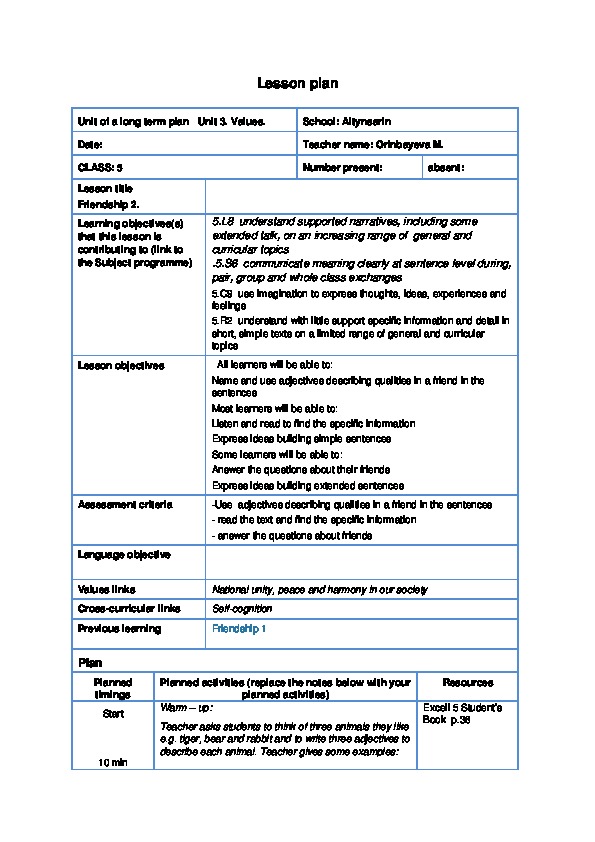Разработка урока "Friendship"
Разработки уроков
docx
английский язык
5 кл
04.03.2018

Краткосрочный план урока в 5 классе на тему " Friendship " составлен в соответствии с программой по английскому языку и будет полезен для учителей английского языка, преподающих в 5 классе по обновленному содержанию образования. В разработке предусмотрено применение активных методов обучения и современных информационных технологий.разработка урока
Friendship 2.docx
Lesson plan
Unit of a long term plan Unit 3. Values.
School: Altynsarin
Date:
CLASS: 5
Lesson title
Friendship 2.
Learning objectives(s)
that this lesson is
contributing to (link to
the Subject programme)
Lesson objectives
Assessment criteria
Language objective
Teacher name: Orinbayeva M.
Number present:
absent:
5.L8 understand supported narratives, including some
extended talk, on an increasing range of general and
curricular topics
.5.S6 communicate meaning clearly at sentence level during,
pair, group and whole class exchanges
5.C9 use imagination to express thoughts, ideas, experiences and
feelings
5.R2 understand with little support specific information and detail in
short, simple texts on a limited range of general and curricular
topics
All learners will be able to:
Name and use adjectives describing qualities in a friend in the
sentences
Most learners will be able to:
Listen and read to find the specific information
Express ideas building simple sentences
Some learners will be able to:
Answer the questions about their friends
Express ideas building extended sentences
Use adjectives describing qualities in a friend in the sentences
read the text and find the specific information
answer the questions about friends
Values links
National unity, peace and harmony in our society
Crosscurricular links
Selfcognition
Previous learning
Friendship 1
Plan
Planned
timings
Start
10 min
Planned activities (replace the notes below with your
planned activities)
Warm – up:
Teacher asks students to think of three animals they like
e.g. tiger, bear and rabbit and to write three adjectives to
describe each animal. Teacher gives some examples:
Resources
Excell 5 Student’s
Book p.38 10 min
Animal Adjective
Tiger aggressive, strong, fast
Bear big, furry, hungry
Rabbit shy, cute, cuddly
They should read out their adjective lists.
Then teacher puts students in groups of four or five and
has them read out their adjectives. But instead of saying
the animal names they must use phrases “I think I am”
+ 3 adjectives, ”My friends think I am” + 3 adjectives, “I
am really “+ 3 adjectives. Teacher explains that the
adjectives represent how they see themselves, how their
friends see them and how they really are. Teacher asks:
Do you get on well with your friends?
Do you visit each other?
Do you often go to the cinema with your friends?
How do we call these relations?
Learners answer the questions and find out the
theme of the lesson “Friendship”.
Teacher introduces the lesson objectives.
Students listen to the words describing qualities of a
friend and repeat them.
Fun
Kind
Friendly
Honest
Helpful
Loyal.
Teacher shows the pictures and students name the
words. Then they must make some sentences using
these words.
e.g. My friend is helpful. Her friend is kind.
Is your friend honest?
Yes, he is.
Is he helpful?
Yes, he is.
Descriptors:
A learner:
Names 56 adjectives describing qualities in a
friend.
Uses these words in the sentences correctly
Answers the questions about their friends Middle
10 min
12 min
correctly.
Peer assessment “Thumbs upsidedown”.
Teacher asks students to look at Inkar’s blog entry.
They listen to the text attentively and find out what are
her best friends like.
“Turn and talk”.
Teacher asks students to turn to someone next to them
and discuss their responses to the following question.
Then teacher tells them to take two minutes to discuss
this with their partner with each person getting some
time to talk.
Descriptors:
A learner:
Answers the questions about Inkar’s friends.
Finds out the necessary information correctly
Uses adjectives describing qualities in a friend
correctly
Read the text again and mark the sentences T(true),
F(false) or DS(doesn’t say).
Inkar has lots of friends on Facebook.
Inkar doesn’t like to share her problems.
1.
2.
3. Amir lives on the same street as Nursultan.
4. Nursultan and Amir never argue.
5. Alina sometimes gossips about Darya.
6. Darya trusts Alina.
Questions
+
True(T)
False(F)
Doesn’t
say(DS)
T
F
DS
T
F
T
1.
2.
3.
4.
5.
6. Formative assessment:
Learners fill in the table and tick the right
answer. Then they count the answers and
assess each other.
Summary task.
Learners make dialogue using adjectives
describing qualities of a friend and role play it in
pairs.
Descriptors:
A learner:
Makes 56 questions and sentences using
adjectives describing qualities of a friend
correctly
Pronounces new words correctly
Assessment
By asking concept checking questions
learners will assess each other. Teacher will
hand out questions written on the
worksheets. Learners will ask and answer
the questions. They’ll draw smiles next to
the questions according to their answers.
E.g. If they understand the question and
answer it, they’ll draw happy smile. If they
don’t understand, they’ll draw sad smile.
End
3 min
Reflection: “321”
.3 things you found out
2 interesting things
1 question you still have.
Learners should write 3 new things they found out, 2
interesting things and 1 question they still have.
Assessment – how are you
planning to check learners’
learning?
Health and safety check
•
Assess the learners by
the help of descriptors for the
tasks
Links to the L1: Can
•
learners describe their friends
in L1?
More support can be
Additional information
Differentiation – how do you
plan to give more support?
How do you plan to
challenge the more able
•
given at the start and in the
middle of lesson by providing
lessable learners with
vocabulary in a word list so
they can read examples of
words seen or heard.
•
confident at making up
sentences, can be given
copies of parts of the
sentences to read aloud.
Learners who are less Moreable learners
•
can be encouraged to use the
full range of language from the
short texts
Reflection
Use the space below to reflect on your lesson. Answer the most
relevant questions from the box on the left about your lesson.
Were the lesson
objectives/learning
objectives
realistic?
Did all the learners
achieve the lesson
objectives/ learning
objectives? If not,
why?
Did my planned
differentiation work
well?
Did I stick to
timings?
What changes did I
Summary evaluation
What two things went really well (consider both teaching and learning)?
1:
2:
What two things would have improved the lesson (consider both teaching and learning)?
1:
2:
What have I learned from this lesson about the class or individuals that will inform my next lesson?
Материалы на данной страницы взяты из открытых истончиков либо размещены пользователем в соответствии с договором-офертой сайта. Вы можете сообщить о нарушении.
04.03.2018
© ООО «Знанио»
С вами с 2009 года.
![]()
О портале

